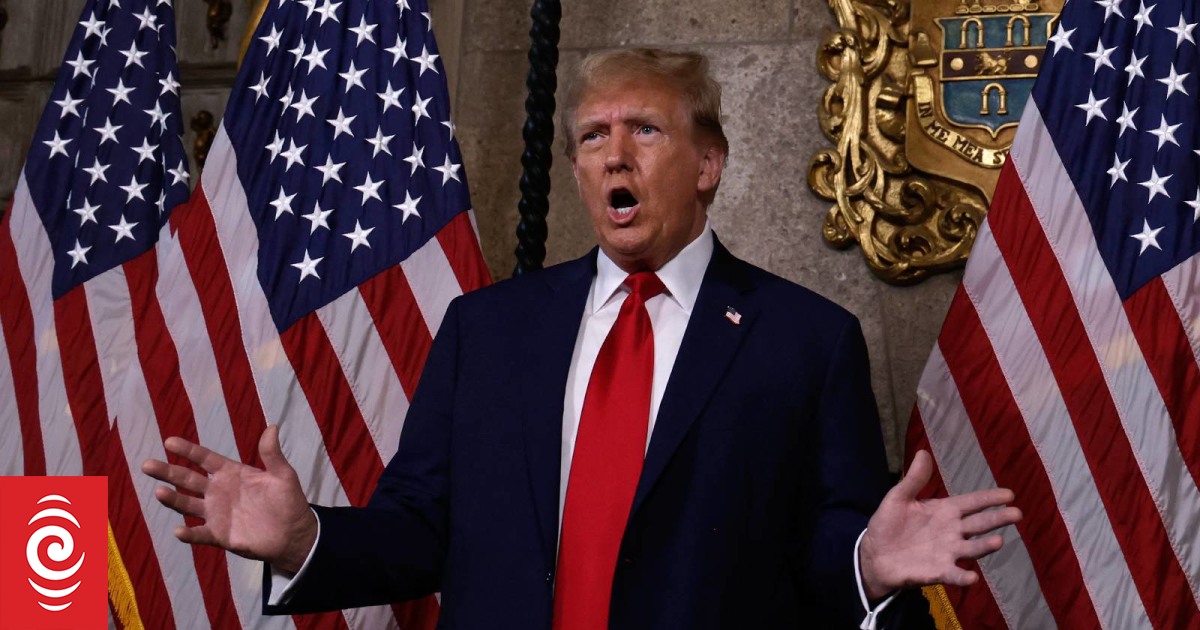
Photo: ALON SKUY / AFP
A New York judge has delayed former US President Donald Trump’s sentencing in his hush money criminal case until after the 5 November election, writing that he wants to avoid the unwarranted perception of a political motive.
Trump, the Republican nominee for president, had previously been scheduled to be sentenced on 18 September.
His lawyers in August asked Justice Juan Merchan to push back his sentencing date until after the vote, citing “naked election-interference objectives.”
Manhattan District Attorney Alvin Bragg, who brought the charges against Trump, is a Democrat.
Merchan said on Friday (Saturday NZT) he now planned to sentence Trump on 26 November, unless the case is dismissed before then.
“The imposition of sentence will be adjourned to avoid any appearance – however unwarranted – that the proceeding has been affected by or seeks to affect the approaching Presidential election in which the Defendant is a candidate,” the judge wrote, opens new tab. “The Court is a fair, impartial and apolitical institution.”
Trump campaign spokesperson Steven Cheung said after the ruling that the case should be dismissed altogether.
“There should be no sentencing in the Manhattan DA’s Election Interference Witch Hunt,” Cheung said in a statement.
In the first-ever criminal trial of a former or current US president, Trump was convicted on 30 May of falsifying business records to cover up his then-lawyer’s $130,000 payment to porn star Stormy Daniels for her silence before the 2016 election about a sexual encounter she says she had with Trump a decade earlier.
Trump denies the encounter and has vowed to appeal the verdict once he is sentenced.
A spokesperson for Bragg said prosecutors are “ready for sentencing on the new date set by the court.”
‘Threaded the needle’
Trump’s lawyers also argued there would not be enough time before the sentencing for the defense to potentially appeal Merchan’s forthcoming ruling on Trump’s request to overturn the conviction due to the US Supreme Court’s landmark decision on presidential immunity.
Merchan had been scheduled to rule on that motion on 16 September. He wrote on Friday he now plans to rule on that motion on 12 November.
The US Supreme Court’s 6-3 ruling, which related to a separate criminal case Trump faces, found that presidents cannot be criminally prosecuted for their official acts, and that evidence of presidents’ official actions cannot be used to help prove criminal cases involving unofficial actions.
Prosecutors with Bragg’s office argued their case involved Trump’s personal conduct, not official acts, so there was no reason to overturn the verdict.
But they took no position on Trump’s request to delay sentencing, saying in an Aug. 16 filing they deferred to Merchan on the question. The prosecutors said an appellate court could delay the sentencing anyway to give itself time to consider Trump’s arguments, a move they said would be “disruptive.”
In declining to advocate for a sentencing date before the election, Bragg may have been conscious of Trump’s oft-repeated claim that the Democratic prosecutor is seeking to interfere in his campaign, said George Grasso, a retired New York state judge who attended Trump’s trial.
“He’s probably appropriately sensitive to opening himself up to charges from Trump and Trump supporters that he’s being too political,” Grasso said. “He threaded the needle.”
Falsifying business records is punishable by up to four years in prison, though punishments such as fines or probation are more common for others convicted of that crime in the past.
If Trump wins the White House, he could potentially order the Department of Justice to drop federal election interference charges against him. He would not have the authority to end the New York state case or an election interference case in Georgia.

